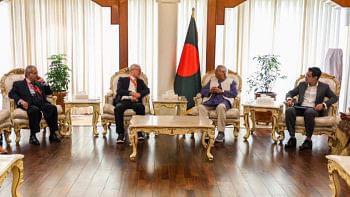Dhaka loses £13m climate funds
Bangladesh has lost around 13 million British pounds of climate fund for adaptation projects as the country's Climate Change Resilience Fund (BCCRF) run by the World Bank is set to close next year.
Department for International Development (DFID) committed the grant for Bangladesh, one of the most climate vulnerable countries in the world, but the fund was returned since the BCCRF is to be closed before the fund will be released.
The Bangladesh government set up the BCCRF in 2010 with contributions from development partners and around $130 million was gathered over the six years.
Though many climate activists protested the move, the World Bank was selected to manage the BCCRF as donors did not want to deliver the fund directly to the government.
"But the World Bank suddenly declined to manage the BCCRF due to lower rate of service charge. Now the government is lobbying donors so that they provide the fund to Bangladesh directly not through the World Bank," said Anwar Hossain Manju, environment and forest minister.
When asked whether the money was already returned, the minister said the DFID was supposed to place the fund but the fund was never placed since the World Bank declined to manage the BCCRF.
Now we have to discuss with donors and decide on the management mechanism of climate related funds of donors, the minister said.
"The World Bank and the donors have decided not to continue with the BCCRF beyond 2017," said an official who did not want to be named.
The BCCRF had received around $130 million from a number of donors, including the European Union, Australia, Switzerland, Denmark, Sweden, USA and the UK, since it was set up.
The annual report of BCCRF mentions that all activities financed through the BCCRF are governed by Bank Policies and Procedures, especially on trust fund management, financial management, procurement, environmental and social safeguards.
The Bank's Trusteeship continues until the end disbursement date of the BCCRF. The original BCCRF end disbursement date was June 30, 2015. In July 2012, the end disbursement date was rescheduled to June 30, 2017.
Earlier, in a statement, the World Bank confirmed that the BCCRF had been closed after a joint decision by donors and the bank.
“Following a review of BCCRF, the donors and the bank jointly decided not to extend the trusteeship, and communicated the desire for strategic planning for a pipeline of climate financed projects,” the WB statement read.
Bangladesh is considered as one of the top vulnerable countries to have the negative impacts of global warming, according to studies of the Inter-governmental Panel on Climate Change (IPCC).
Scientists and climate experts predicted that Bangladesh needs billions of dollars for adaptation.
Apart from the government's fund, Bangladesh also formed another fund called Bangladesh Climate Change Trust Fund (BCCTF) and now has allocated about $400 million equivalent towards tackling climate change.
Though BCCTF and BCCRF had different government structures, both funds supported climate change related projects identified under the Bangladesh Climate Change Strategic and Action Plan (BCCSAP).

 For all latest news, follow The Daily Star's Google News channel.
For all latest news, follow The Daily Star's Google News channel. 



Comments